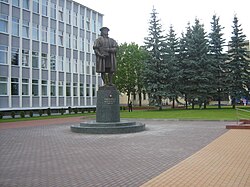| This article needs additional citations for verification. Please help improve this article by adding citations to reliable sources. Unsourced material may be challenged and removed. Find sources: "Abraomas Kulvietis" – news · newspapers · books · scholar · JSTOR (November 2023) (Learn how and when to remove this message) |

Abraomas Kulvietis (Latin: Abraham Culvensis; Polish: Abraham Kulwieć; c. 1509 – 19 June 1545) was a Lithuanian jurist and a professor at Königsberg Albertina University, as well as a reformer of the church.
Kulvietis was born in Kulva, now in the Jonava district of Lithuania, into an old Lithuanian noble family of middle wealth. Between 1528 and 1537 he studied in many universities across Europe. At first in Cracow Academy, later, as he became aware of humanist reforms, he moved to the Catholic University of Leuven, where he studied the works of Desiderius Erasmus. He continued his education in Wittenberg, where he studied Martin Luther's teachings. In 1536 he moved to Leipzig and finally Siena, where in 1537 he was granted the title Doctor of Law.
After receiving his title, Kulvietis returned to the Great Duchy of Lithuania, giving lectures in Vilnius and working under the protection of Queen Bona Sforza and King of Poland and Grand Duke of Lithuania Sigismund II Augustus.

In 1540 Kulvietis founded his own school where he taught about 60 pupils in Lithuanian. He was generally unpopular among the Roman Catholic hierarchy because of his Lutheran beliefs, and when the queen was away in 1542 Kulvietis was forced to leave the country.
He was invited by Albert, Duke of Prussia together with other Lithuanian Lutherans, and together with them helped in the creation of the Königsberg Albertina University, and later he was the first professor of classic Hebrew and Greek. He was also the first translator of Lithuanian Evangelical songs.
In 1545, Kulvietis was allowed to visit his dying mother in Lithuania. Perhaps he was already ill with tuberculosis when he left the Duchy of Prussia, but is rumored to have been poisoned there by enemies and he died at his parents' home in Kulva.
Kulvietis's 24-line Lithuanian language hymnal "Malonus dėkavojimas Ponui Dievui" was printed in Martynas Mažvydas's collection Gesmes Chriksczoniskas, Gedomas Baszniczosu Per Aduenta ir Kaledas ik Gramniczu.
Works
- "Confessio fidei Abr. Culvensis", 1543
References
- Norman Davies (1984). God's Playground: A History of Poland. Columbia University Press. p. 139. ISBN 0-231-05351-7.
- Vilnius School of Kulvietis Archived January 21, 2009, at the Wayback Machine
Further reading
- Vaclovas Biržiška, "Abraham Kulvietis, The First Lithuanian Humanist", in Contributions of Baltic University Pinneberg, No. 47 (1947): 11.
- (in German) Ed. Kneifel. Die Pastoren der Ev.-Augsb. Kirche in Polen, o. J. 213.
- (in German) Bense, Gertrud: Zum regionalen und personalen Umfeld des früheren preußisch-litauischen Schrifttums. In: Annaberger Annalen 4 (1996), Seite 55-67
- (in Lithuanian) Kulvietis' bio and timeline of events
- 1500s births
- 1545 deaths
- 16th-century deaths from tuberculosis
- 16th-century writers in Latin
- 16th-century Lithuanian nobility
- Lithuanian emigrants
- Lithuanian writers
- Lithuanian translators
- Translators from Lithuanian
- Translators to Lithuanian
- Lithuania Minor
- Lithuanian Lutherans
- History of the Lithuanian language
- Jagiellonian University alumni
- Old University of Leuven alumni
- University of Wittenberg alumni
- Leipzig University alumni
- Academic staff of the University of Königsberg
- People from Jonava
- Tuberculosis deaths in Lithuania